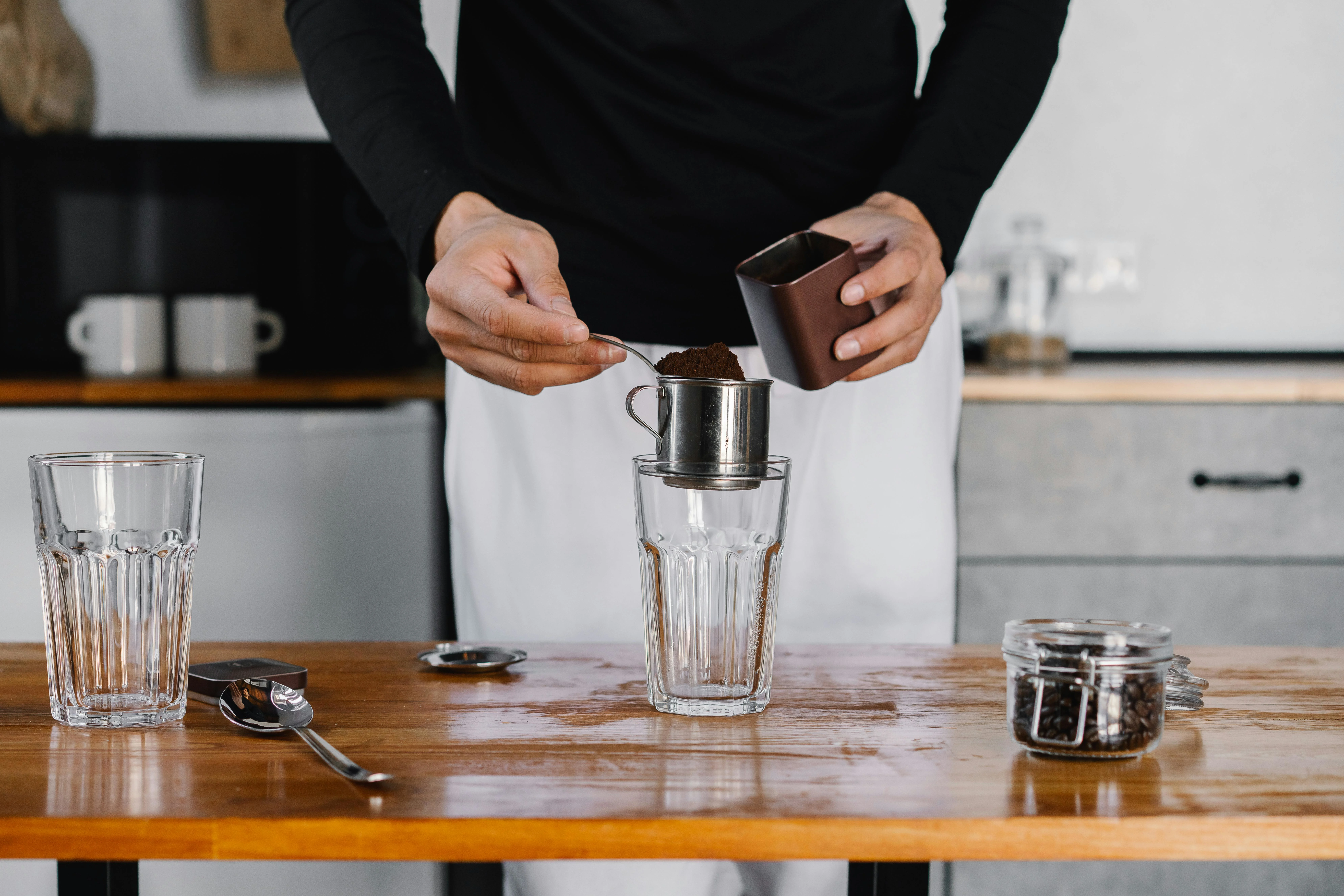For a lot of people, coffee is more than just a caffeine fix—it’s a ritual, a moment of comfort, and sometimes, a lifesaver on busy days. But it can offer more than these things, particularly when you add a pinch of baking soda to it.
This might sound unconventional, but baking soda is a versatile pantry staple, and when paired with coffee, it works wonders. Whether you’re dealing with overly bitter beans or sensitive to the acidity in coffee, this trick could be a game-changer. Plus, it’s quick, easy, and doesn’t alter your brewing process!

The Versatility of Baking Soda in the Kitchen
Baking soda is a true multitasker in the kitchen, going far beyond its role as a leavening agent in baking. This humble white powder has earned its place as a staple ingredient, thanks to its wide range of uses that simplify cooking, cleaning, and more. Its alkaline nature makes it a powerful tool for balancing flavors, enhancing textures, and even improving the quality of certain foods.
In cooking, baking soda can be used to tenderize tough cuts of meat or soften beans for quicker cooking. It’s also a secret weapon for perfectly crispy fried foods, as it helps create that golden-brown crust by adjusting the pH levels during frying. And when it comes to flavor, baking soda shines as a bitterness balancer, taming overly acidic or harsh tastes in recipes like tomato sauces, soups, and yes, even coffee.
The Relationship Between Baking Soda and Coffee
At first glance, baking soda and coffee might seem like an unlikely pair, but their interaction is rooted in simple chemistry. Baking soda, also known as sodium bicarbonate, is an alkaline compound with a high pH level. When added to coffee, it works to neutralize the drink’s natural acidity, balancing the pH and reducing harsh, sour tones. This process creates a smoother, more enjoyable flavor profile without masking the coffee’s natural richness.
When it comes to mixing baking soda with common coffee additions like milk, creamers, or flavored syrups, the combination remains harmonious. Baking soda complements these add-ins by softening acidic or bitter notes, allowing the flavors of milk or syrups to stand out more prominently. For instance, sweeteners like vanilla or caramel syrups may taste even richer, as baking soda helps mellow competing bitterness. Similarly, creamers can blend more seamlessly, enhancing the smoothness of the drink. However, it’s worth noting that overly flavored or heavily processed creamers may not pair as well, as they could clash with the subtle taste adjustment from baking soda.
Below, four (4) practical ways a pinch of baking soda can enhance your coffee experience.

1. Neutralizing Acidity
Coffee’s natural acidity can cause discomfort, especially for individuals prone to acid reflux or sensitive stomachs. The alkaline nature of baking soda helps neutralize this acidity, creating a smoother cup that’s easier to digest. This is particularly useful for dark roasts or high-acid coffee blends.
To use this trick, add about 1/8 teaspoon of baking soda to your coffee grounds before brewing or directly to a brewed cup. This small addition won’t affect the flavor but can significantly reduce the acidic punch, making your coffee more enjoyable and stomach-friendly.
2. Reducing Bitterness
Bitterness in coffee can stem from over-extraction, burnt beans, or brewing mistakes, making your morning ritual less pleasant. Baking soda’s ability to counteract bitterness comes from its alkaline properties, which balance out harsh, bitter notes.
Adding a pinch—just a tiny amount—to your coffee can soften these sharp flavors without masking the coffee’s natural richness. Be cautious not to overdo it, as too much baking soda can create a soapy taste. A light sprinkle stirred thoroughly is all you need for a better-tasting brew.
3. Improving Water Quality
Water plays a critical role in coffee brewing, and hard water—rich in minerals like calcium and magnesium—can interfere with flavor extraction. Baking soda softens hard water by neutralizing excess minerals, which results in a cleaner and more balanced coffee taste.
To maximize this benefit, sprinkle a small pinch of baking soda into your coffee grounds before brewing. This simple step enhances the overall smoothness and lets the full flavor profile of your coffee beans shine through, especially if your water source is mineral-heavy.
4. Aiding Sweeteners
If you enjoy sweetened coffee, baking soda can elevate the sweetness by reducing competing bitter or acidic tones. This makes your chosen sweetener—whether it’s sugar, honey, or a natural alternative—taste more pronounced, allowing you to use less. Baking soda doesn’t add sweetness itself but enhances the harmony of flavors in your cup.
To try this, mix a small pinch of baking soda into your coffee, then add your preferred sweetener. The result is a smoother, more balanced coffee that doesn’t require as much sugar to taste great.
Finding the Perfect Balance With Baking Soda in Coffee
Experimentation is key when incorporating baking soda into your coffee routine. Different coffee types, roasts, and brewing methods all influence how baking soda interacts with your cup. For example, dark roasts, which are naturally less acidic but more bitter, may benefit from a pinch of baking soda to tame the bitterness. In contrast, lighter roasts, known for their bright acidity, might require just a touch to balance their sharper flavors. Similarly, brewing methods like pour-over or French press can highlight different flavor profiles, so it’s worth testing to see which combination works best for your palate.
However, it’s crucial to avoid adding too much baking soda, as it can result in an unpleasant, soapy taste that overwhelms your coffee. A small pinch—around 1/8 teaspoon—is typically enough to balance the flavors without altering the taste negatively. If you’re unsure, start with an even smaller amount and gradually adjust to taste. It’s also helpful to mix thoroughly to ensure the baking soda is evenly distributed and doesn’t clump, which can affect the flavor.
A Simple Hack, Not a Cure
Adding a pinch of baking soda to coffee is a clever way to enhance your daily brew—reducing acidity, balancing bitterness, and even improving flavor when paired with sweeteners or creamers. It’s a small change with big potential, offering a smoother and more enjoyable coffee experience. However, it’s important to remember that this is purely a flavor and comfort hack, not a medicinal solution.
If you experience health issues like acid reflux or stomach sensitivity, consult a healthcare professional for appropriate advice and treatment. While baking soda can neutralize acidity in coffee, it is not a replacement for medical care or prescribed remedies. Use this trick wisely and in moderation to elevate your coffee, keeping the focus on flavor and enjoyment.




Jordyn Benson
Saturday 21st of June 2025
Scalable Hosting Solutions for Growing Businesses: Complete Guide - https://digitalfinds.reviewfriendly.com/scalable-hosting-solutions/
Willie Cortez
Sunday 1st of June 2025
Treat yourself—your jewelry box is crying for an upgrade! 💖 https://bit.ly/jewelry-colleciton
Jerry Lopez
Saturday 17th of May 2025
Supercharge your online business with the ultimate managed hosting solution — experience speed, security, and simplicity with Cloudways!
Gunnar Park
Thursday 15th of May 2025
Speed is everything in eCommerce – this article breaks down the best hosting for WooCommerce.
Judith Lowery
Saturday 10th of May 2025
Great insight! Managing cloud servers often seems complex, but Cloudways takes the stress out of the equation. Their platform delivers powerful performance without the usual technical headaches. It’s an ideal solution for those who want scalable hosting without getting lost in server configurations. Definitely worth checking out for a smoother hosting journey. Keep up the excellent work! Explore more through the link.